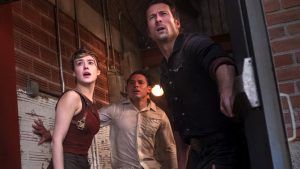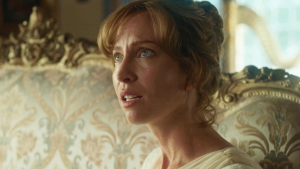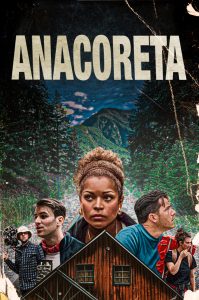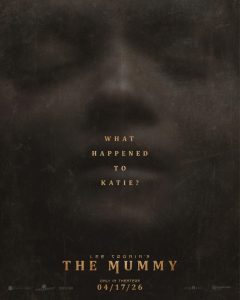In this year’s short film collection at Slamdance 2024, there’s a plethora of talented and extraordinary artists. Among them is Cynthia Garcia Williams, whose horror short, Legend of El Cucuy, stands out as innovative and eerie.
I was able to sit down with the writer/director to learn more about her relationship with the legend, her process, her inspirations, and much more!
This interview has been edited for clarity.
This is Kristy Strouse with Film Inquiry, congratulations on the short!
Cynthia Garcia Williams: Thank you!
Are you having a good time?
Cynthia Garcia Williams: Yes, I love it here!
My first question is kind of a double-sided question. I’m just curious as to where the origin of this film came from but also what your personal history is with this legend?
Cynthia Garcia Williams: It is specific to my own experience; in my family’s culture, my dad is from Guadalajara. We grew up with it, you know, El Cucuy, that and just never really knowing what exactly it was but just that it was going to get you if you didn’t behave or didn’t go to sleep on time, whatever. So the journey… I was challenging myself to write a horror because I had never written one. I had no idea what to write about. My husband said, “Well, they say, you know, write what you know, right?” And I’m like, “Yeah, what does that mean?” He’s like, “What’s scary? What’s the scariest thing that you can think of that could happen?” And I’m like, “Losing a child.” And then from there, it just… I wrote that script so quickly. I feel like it wanted to be born, you know? There was something inside me that wanted to, especially at that time in my life because my eldest daughter was moving out of state. So I was kind of processing the things that we do as parents to try to give our children a better life. And you know, like I moved from the city to the suburbs to give my kids a better life, but now she’s moving to another state because she doesn’t want to raise them in California, you know what I mean? And so, we’re always trying to do better. And I really wanted to look at that in a creative way, the trauma that we experience as children, the way we try to do things so differently, and you know, the balance may be that we need, like what’s too much discipline, what’s not enough discipline? You know, I mean, there’s a lot of parenting now. It’s a thing, and so, you know, do you spank, do you not spank?
So, you took from your childhood, and you were scared that this was the worst that would happen if you misbehaved. Do you think that strategy worked?
Cynthia Garcia Williams: It’s so funny because I was talking to somebody just yesterday, and they were like, “Oh, would you do things different?” I’m like, “Oh yeah, I did things differently.” And as I was saying that, I remembered, which I hadn’t even thought about in all this time since I made the film and everything, but I used to tell my kids that if they didn’t clean up that like black bad spirits lived in the piles of clothes in the room, and you know, “you don’t want anything evil in here, right? “No, we’ll clean up,” you know? And so I had my own version of El Cucuy with my kids, but no, I did not use him specifically. We all try to do better, especially now with all our knowledge around intergenerational trauma and stuff like that, we’re all trying to heal for the future generations… but we want to try to give grace, I think, yeah, you know, to our parents.
I think that’s definitely true. Was it kind of cathartic, writing this?
Cynthia Garcia Williams: 100%, there was so much about this film that was cathartic. I cried a lot, while writing it, and it’s a horror film, you know what I mean? I cried for Cucuy, I cried for the main character. It was really hard for me to not empathize with him, you know, for a lot of reasons, mainly because he’s an alcoholic and, you know, I have been sober for 23 years, coming right up.
Congrats on that milestone!
Cynthia Garcia Williams: Thank you. And I feel like alcoholism, drug addiction make us monsters as parents, you know what I mean? And so I have a lot of compassion for him. I had to check myself as a director. Because, I know what he’s supposed to be, but there was… I loved him so much and felt so sad for him, so that was interesting. I think when you’re writing, you kind of discover new things about yourself, and no matter what you say, I think every part of writing, whether it be horror, drama, whatever genre, is, you know, an extension of you, but also you’re like working through something. Yes, it’s every time.
So as your first horror, have you considered making this into a feature?
Cynthia Garcia Williams: I’ve just finished the script.
I was going to say: this screams feature-length!
Cynthia Garcia Williams: Oh, thank you. Yeah, from your mouth to God’s ears, I always say. I hope so. I really hope that somebody wants to develop it into something bigger. There are parts of the story that I want to put in. Most people walk away like what happens next?
Without giving away the plot, does this continue with the same family?
Cynthia Garcia Williams: It expands, and goes back a little. It is a feature, so you get to know Carlos a lot better, the father. He’s a Latino literature professor, and that’s what I wrote him as in the short, but we don’t get to experience him that much. Some things about Laura too, but a few things about Cukuy’s story that I wasn’t able to get into, like how it went from, man monster and then what he ended up being at the end, right? There are some steps in between there that I’d like people to know. Short films don’t necessarily tell you everything, and 15 minutes, no, with credits. I think those are the things that people will see and I feel pretty good about them. I’ve had positive reactions to it.
So did you have the feature in mind when you were writing the short, like did you have all these characters’ stories, well?
Cynthia Garcia Williams: I always do a lot of, who’s this person, where they come from, kind of bring you to that, always. So, but Carlos in particular has, because he really didn’t get, we didn’t get to, experience him that well. And so he specifically has, a pretty interesting life that he’s coming from.
So your premiere’s tonight, what do you hope that people take away from that?
Cynthia Garcia Williams: I hope they take away there’s an element of community in it, that we have neighbors who are hurting really bad, we’re judging them, and asking questions of, “What’s wrong with that person?” Like when you see the parent in the grocery store and the kid is having a tantrum and everybody’s kind of like, instead of coming in and saying, “Hey, can I help you with something?” Can I push your cart, can I, maybe not take your kid but can I help you do something? So I’d like people to take that. Also, that we are Latinos, are incredibly diverse, and really one of the things that I wanted to convey because Carlos and Laura are so different, and we’re not like just because you’re from Latin America doesn’t mean you’ve ever heard of the Kukui. It’s only in specific countries, there are other, boogeymen, and boogeywomen in other places. And so just hopefully people will go like, “Wow, that’s interesting that they were both Latino and like one didn’t know what it was and why is that,” maybe and maybe find their own, like, similarity to their own.
Now that you’ve got the horror bug. Will you continue to work within the genre?
Cynthia Garcia Williams: Yeah, other things have come up that I think could be interesting, but I also just worked on a rom-com.
Dipping your toes in a bit of everything!
Cynthia Garcia Williams: I think where I settle probably more than anything is mystical realism, any of the dramatic things that I’ve done have always had an element of magic. I tried to keep Cucuy grounded, right, with a little bit of magic also. And then the rom-com has that too, so for sure, it’s like the signs, so everything I do, that’s usually the common thread. One of the things I appreciate about myself is that I haven’t been afraid to play with different things, whether it’s a campy film or heavy drama. I haven’t limited myself in the things that I’ve written, and I think the directors that I admire the most are all doing all kinds of different stuff.
Can I ask what some of the directors are?
Cynthia Garcia Williams: I love Steven Spielberg, probably because I grew up with him. I know everybody loves his movie magic, but what I love about him is that he does all kinds of different stuff, and you never feel it’s even needed to explain, right? I said foreign directors that probably people don’t know as well, but I have so much admiration, especially now that I’ve made my own films for directors. For how hard things are, for how much of a miracle it is that a film is even made, there are so many things that go in that people could not possibly understand. So when people critique things really harshly and stuff like that, it makes me really sad, right? Because I don’t think anybody, we don’t set out to make a bad movie, you know what I mean? But there are so many factors, and then even then, who knows if anybody’s gonna get the message? So, it’s an incredibly vulnerable profession, and get a therapist early on.
Does content like this matter to you?
Become a Member and support film journalism. Unlock access to all of Film Inquiry`s great articles. Join a community of like-minded readers who are passionate about cinema – get access to our private members Network, give back to independent filmmakers, and more.











